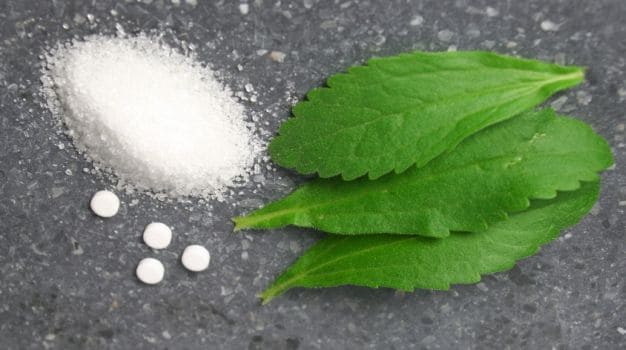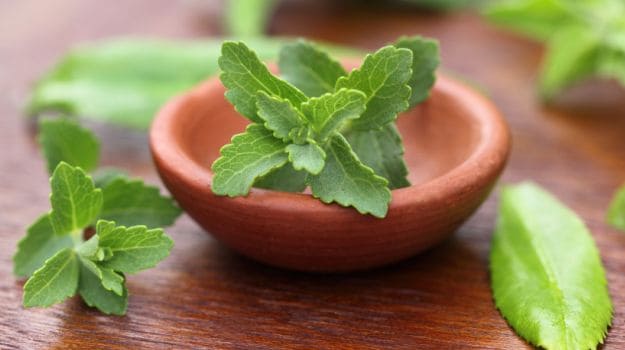[ad_1]
Sweetness is one of life’s simple pleasures, but too much sugar in your food can be detrimental to your health. Numerous studies have documented the ill effects of excessive sugar intake, and as our societies become more urbanized, the consumption of sugar from sweets, sugary drinks, flavoured yogurt, ice creams, bakery goods, and processed foods has seen a sharp increase. With the population becoming more aware of the detrimental effect of sugar, there has been a boom in replacing sugar with artificial sweeteners. But with so many options available, it can be challenging to determine which one is the right choice for you. In this article, we’ll explore the difference between sugar and artificial sweeteners, the health impact of sugar, and why stevia, a natural and herbal sweetener, maybe the right choice.
Sugar: A Brief Overview
Sugar, or sucrose, is naturally present in most foods that contain carbohydrates. Natural sugar from veggies, whole grains, and dairy is safe as it comes along with other essential healthy nutrients. The problem is refined sugar in large quantities. The added sugar in processed foods, in addition to table sugar and honey, all add up to a large quantity that has a detrimental effect on health. The World Health Organization (WHO) recommends that not more than 10% of the total calories for the day should come from sugars. We may be conscious of the sugar we add to our tea and coffee, but we are unaware of the sugar we consume through processed foods like ketchup, soup pre-mixes, juices, breakfast cereals etc.
Health Impact of Sugar
Obesity
Sugars provide empty calories and also wire the brain to crave sugary food. Most of the sugary foods are calorie-dense and add no nutrients, and have been linked to obesity because of a calorie surplus.
Heart diseases
Obesity is a strong indicator of poor heart health. Excessive sugar intake is also linked to higher blood pressure, inflammation, and fatty liver, all of which have a negative effect on heart health.
Liver and cholesterol metabolism
Excessive sugar in the diet prompts the liver to increase fat deposits. It also plays havoc with cholesterol metabolism, which is regulated through the liver. The end result is increased LDL and decreased HDL.
Diabetes
Diabetics show the most profound impact. Simple sugars spike blood glucose levels, which then prompt increased insulin requirements. The sugars are assimilated fast, leaving the insulin high, which then may prompt hypoglycemia or increased hunger.
Also Read: 6 Expert-Recommended Healthy Sugar Alternatives You May Try

Opt for natural sugars that are found in fruits. Photo: iStock
Artificial Sweeteners
Artificial sweeteners are sugar substitutes that add sweetness without adding calories. By taste, they are 200-700 times sweeter, but as they are not broken down by our digestive system, they do not add calories to our meals. The Food Safety and Standards Authority of India (FSSAI) describes them as food additives and says that these substances must provide less than 2% of the calories compared to sucrose. FSSAI approves Erythritol, Steviol glycoside, Thaumatin, Aspartame, Sucralose, Alitame, Neotame, Acesulfame potassium, Aspartame-Acesulfame potassium salt, and Saccharins. All the above-listed sweeteners are said to be safe but are chemicals.
Stevia: The Natural Sweetener
Stevia is a natural sweetener that is derived from the leaves of the Stevia rebaudiana plant, which is native to South America. The plant has been used for centuries by the Guarani people of Paraguay as a sweetener in their tea and medicinal concoctions. It was not until the 20th century that the sweetening properties of Stevia were first isolated and studied by scientists.
Also Read: Jaggery Or Sugar – Which Is Healthier? Expert Reveals

Stevia is known for its sweetness without calories, making it a popular sugar substitute in many countries around the world. In fact, it is approved for use as a food additive in more than 150 countries, including the United States, Japan, and the European Union. Stevia is also becoming increasingly popular in India as a healthier alternative to sugar.
Stevia is available in several forms, including as a liquid extract, powder, or in its natural leaf form. The extract is made by boiling the Stevia leaves in water and then filtering out the solid particles, leaving behind a sweet liquid. The liquid extract can be used to sweeten tea, coffee, or any other beverage, and can also be used in cooking and baking. Stevia powder is a concentrated form of the extract and is typically used in baking and other recipes that require a dry sweetener. The natural leaf form of Stevia can be used in teas or other beverages, but it is not as sweet as the extract or powder.
Stevia Vs Sugar: Advantages Of Stevia Over Sugar
There are several advantages of using Stevia over sugar as a sweetener. Here are some of them:
1. Zero calories
Stevia contains zero calories, making it an ideal sugar substitute for people looking to lose weight or maintain a healthy weight.
2. Low glycemic index
The glycemic index (GI) is a measure of how quickly a food raises blood sugar levels. Foods with a high GI can cause a rapid spike in blood sugar, while foods with a low GI cause a slower, more gradual increase. Stevia has a very low GI, making it a good choice for people with diabetes or those looking to manage their blood sugar levels.
Also Read: 4 Natural Sweeteners That Vegans May Add To Their Diet

3. No impact on teeth
Sugar is known to cause tooth decay and cavities. Stevia, on the other hand, does not have any impact on dental health.
4. Anti-oxidant properties
Stevia has been found to have antioxidant properties, which can help to protect the body from free radicals and other harmful substances.
5. Safe for consumption
Stevia is generally considered safe for consumption and has been approved for use by numerous health organizations around the world, including the FSSAI, WHO and FDA.
6. Environmentally friendly
Stevia is a natural product that is grown and harvested without the use of chemicals or synthetic fertilizers, making it a more environmentally friendly option than sugar.
Bottom Line:
While sugar is a natural product that has been consumed by humans for thousands of years, excessive consumption can have negative effects on health. Stevia, on the other hand, is a natural sweetener that provides sweetness without calories, making it a healthier alternative to sugar. With the increase in awareness about the harmful effects of sugar, more and more people are turning to Stevia as a natural sugar substitute. However, it is important to remember that Stevia should be used in moderation, and should not be seen as a substitute for a healthy, balanced diet and lifestyle.
Disclaimer: The opinions expressed within this article are the personal opinions of the author. NDTV is not responsible for the accuracy, completeness, suitability, or validity of any information on this article. All information is provided on an as-is basis. The information, facts or opinions appearing in the article do not reflect the views of NDTV and NDTV does not assume any responsibility or liability for the same.
[ad_2]
Source link
